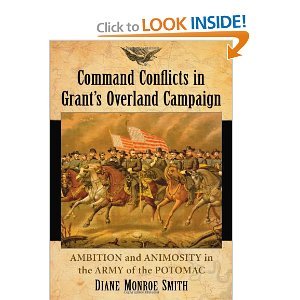“Howeffer did zey vin!” mutters a German guest at Faulty Towers, staring down upon the hapless and prostrate Basil Faulty at the end of that British series’ classic, “The Germans.”
I found myself repeating it like a mantra as I plowed through Diane Monroe Smith’s “Command Conflicts in Grant’s Overland Campaign: Ambition and Animosity in the Army of the Potomac.” Fights, fisticuffs, even a murder; tale-telling, if not outright lying, to their political patrons in Washington; blind faith in some fortified by myopic suspicion of others: all these were apparently par for the course among the general officers of the Union army during the Civil War.
Previously, the author has written two books about Joshua Chamberlain — “Fanny & Joshua” (about the Maine hero’s private life) and “Chamberlain at Petersburg: The Charge at Fort Hell.” Evidently it was the latter (for which she found Chamberlain’s previously unpublished narrative of that long siege) that inspired her to investigate the road to Petersburg, Grant’s Overland Campaign of 1864.
“Command Conflicts” actually begins in 1861 with a hard-luck U.S. Grant who had “failed at everything he had undertaken.” This included farming and business as well as the military. And yet in three years he would be the supreme commander of the Army of the United States; in seven, he would be elected its president. To find out how, Smith begins, “one must look to his friends, or at least those who professed to be his friends, and his other ambitious supporters.”
All but the first of Grant’s friends were developed in or from the field of battle. The exception was Elihu Washburne, a Mainer by birth, who had sought success by moving to Galena, Ill. As the Civil War started, Grant was working in a tannery in the same city; Washburne was a congressman who had Abraham Lincoln’s ear. Suffice it to say, as Smith records, Lincoln later said to Washburne, “About all I know of Grant I have got from you.”
Thus, says Smith, were sown the seeds of Grant’s “meteoric rise.” She follows the ambitious brigadier general through his early campaigns in the Western theater of the war, where he won a series of minor victories. Then comes the slaughter at Shiloh, which turned out “despite many blunders, to be another nail in the Confederacy’s coffin.”
Smith gives her Chapter Three a telling title: “It Takes Buell (another Union general) and Bragg (‘the ever-vacillating’ Confederate general) to Make Grant Look Good.” Nonetheless, early in 1864, Grant was made lieutenant general, a rank that had only been attained before by George Washington and Winfield Scott. With his new promotion, he set out with the Army of the Potomac to destroy Lee’s Army of Northern Virginia in what became known as the Overland Campaign.
At this point, Smith introduces a second thread to her narrative: V Corps and its energetic but sensible commander, Gen. Gouverneur Warren. That one of Warren’s divisions was Chamberlain’s 20th Maine is no coincidence. It was Warren who, “serving as (General) Meade’s chief engineer, distinguished himself on the second day of Gettysburg by directing the timely occupation of Little Round Top,” at which Chamberlain’s Mainers famously proved themselves. Despite this success, the story of the Overland Campaign is one of vicious head-butting with Warren on one side and his superiors, Grant and Meade, on the other. The losers were the men who suffered enormous casualties, often for very little gain.
The author clearly sides with Warren. She also points up the cronyism and sycophancy among the officers with whom Grant felt comfortable and surrounded himself. Most famous among them are Sherman and Sheridan, the latter coming off particularly badly.
To get to the bottom of this gripping story, Smith has done an astonishing amount of research. “Knowing who was actively promoting whom,” she explains, “or who was depending upon others to further their own careers or destroy a rival’s reputation, reveals much.”
But the book is a hard slog for anyone who is not already a Civil War buff. Completely negligent editing has resulted in phrases, sentences, whole paragraphs that restate the same thing. Perhaps it reflects a military historian’s precision, but Smith’s habit of stating the same proper names twice, sometimes three times in the same sentence makes the layman long for the judicious use of the personal pronoun. In the author’s defense, internecine warfare — her primary subject — is, by the nature of what it must consider, less linear than the straightforward account of a battle.
But trying to follow both, I found it difficult to keep sight of the forest for the trees. It is, nonetheless, a significant addition to Civil War history.
Thomas Urquhart is a freelance writer and author of “For the Beauty of the Earth.”
Send questions/comments to the editors.



Success. Please wait for the page to reload. If the page does not reload within 5 seconds, please refresh the page.
Enter your email and password to access comments.
Hi, to comment on stories you must . This profile is in addition to your subscription and website login.
Already have a commenting profile? .
Invalid username/password.
Please check your email to confirm and complete your registration.
Only subscribers are eligible to post comments. Please subscribe or login first for digital access. Here’s why.
Use the form below to reset your password. When you've submitted your account email, we will send an email with a reset code.